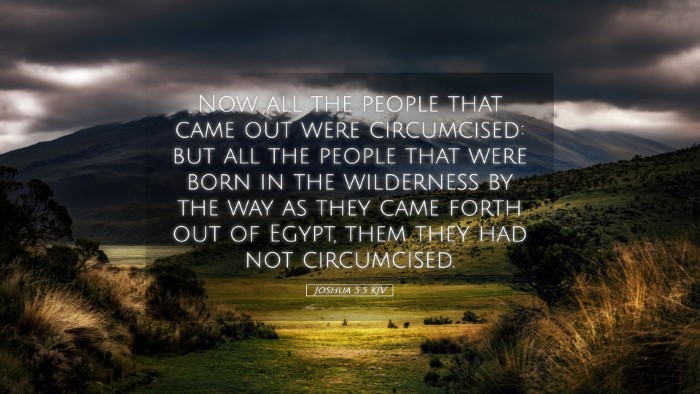Old Testament
Genesis Exodus Leviticus Numbers Deuteronomy Joshua Judges Ruth 1 Samuel 2 Samuel 1 Kings 2 Kings 1 Chronicles 2 Chronicles Ezra Nehemiah Esther Job Psalms Proverbs Ecclesiastes Song of Solomon Isaiah Jeremiah Lamentations Ezekiel Daniel Hosea Joel Amos Obadiah Jonah Micah Nahum Habakkuk Zephaniah Haggai Zechariah MalachiJoshua 5:5
Joshua 5:5 KJV
Now all the people that came out were circumcised: but all the people that were born in the wilderness by the way as they came forth out of Egypt, them they had not circumcised.
Joshua 5:5 Bible Commentary
Commentary on Joshua 5:5
In Joshua 5:5, we find a crucial moment in the narrative of the Israelites as they prepare to enter the Promised Land. This verse recounts an important aspect of the covenant relationship between God and His people, specifically in the context of their identity and status as they transition into a new phase of their journey.
Text of Joshua 5:5
"Now all the people that came out were circumcised: but all the people that were born in the wilderness by the way as they came forth out of Egypt, them they had not circumcised."
Introduction
This verse presents a significant theological implication regarding the covenant of circumcision. It denotes a break in the continuity of the covenant community as the older generation, who had been circumcised, dies in the wilderness, and a new generation arises without this critical sign of God's covenant.
The Covenant Significance
The act of circumcision was a rite established by God as a symbol of His covenant with Abraham (Genesis 17:10-14). By excluding the new generation from this sign, the Israelites face a dual challenge—they must not only conquer the land but also reaffirm their identity as God’s chosen people.
Matthew Henry's Insight
According to Matthew Henry, the forgotten practice of circumcision highlights the neglect of the covenant and points to the importance of fidelity to divine command. He emphasizes that while God’s promises remain steadfast, humans must actively maintain their covenant relationship by adhering to the signs and practices instituted by God.
Albert Barnes' Commentary
Albert Barnes notes that this situation illustrates the necessity for the new generation to return to the essential practices of their faith. The failure to circumcise the children born during the wilderness wanderings demonstrates a disconnect from the covenant relationship. Barnes underscores that recommitting to this rite is vital for spiritual renewal and community identity as they prepare to take possession of the land.
Adam Clarke's Observations
Adam Clarke offers a pastoral approach to this passage, acknowledging the potential spiritual implications of neglect and the necessity for recommitment. Clarke asserts that the physical act of circumcision, while rooted in the Old Testament law, symbolizes a deeper spiritual truth—purity and separation from the world. He observes that just as the physical circumcision was a sign for Israel, so spiritual circumcision remains essential for Christians, denoting heart transformation and commitment to God's ways.
Theological Reflections
As we explore the themes embedded in this verse, several key theological reflections arise:
- Covenant Relationship: The act of circumcision serves as a reminder of the covenantal relationship that God establishes with His people. It underscores the idea that physical symbols play significant roles in spiritual realities.
- Generational Faithfulness: The new generation’s lack of circumcision symbolizes a potential failure in the spiritual legacy. It prompts contemporary readers to consider how faith is passed down through generations.
- Preparation for Service: Before the Israelites can enter the Promised Land, they must spiritually prepare through this sacramental act. This reflects the broader biblical principle that spiritual renewal is often necessary before engaging in divine mission.
Application for Modern Believers
For pastors, students, and scholars, this verse calls for introspection and assessment of our community identity and practices. The neglect of sacred traditions could indicate a larger spiritual malaise:
- Reaffirming Identity: Just as circumcision affirmed the Israelites' identity, modern believers must consider how baptism, membership, and other sacraments affirm their identity in Christ.
- Emphasizing Spiritual Growth: This verse urges the church to cultivate and teach foundational practices to future generations, ensuring they understand and embrace their faith.
- God's Faithfulness Amidst Human Neglect: Despite human failings, God remains faithful. This truth encourages believers to rely on divine grace for renewal and restoration.
Conclusion
Joshua 5:5 serves as a profound reminder of the need for spiritual vigilance and the importance of living out our covenant responsibilities. The insights from Henry, Barnes, and Clarke compel us to examine our practices, affirm our identities, and prepare for the mission that lies ahead. As Joshua and the Israelites stood on the brink of their promise, so too we must ready ourselves to step forward into God’s calling, embracing the tangible expressions of our faith with reverence and commitment.


